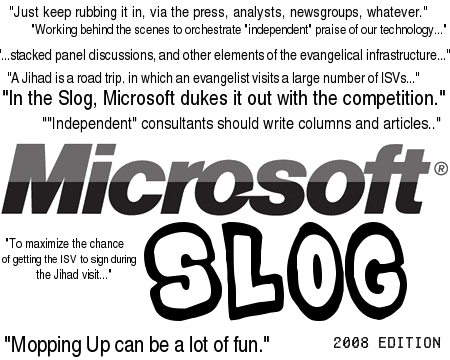06.14.15
Posted in Deception, Free/Libre Software, Microsoft at 5:28 pm by Dr. Roy Schestowitz
Treating ‘Open Source’ like a trash can or a wastebasket

Summary: Microsoft is hoping to achieve/get some positive karma (the openwashing effect) by putting a Windows tool that has essentially been abandoned (or made obsolete) in the ‘Open Source’ domain
Using “Abandoned Software” (AS) to label Microsoft “Open Source” (OS) isn’t a novel concept. It has been done by Microsoft before, even if the “OS” part too was altogether bogus (look but do not touch).
Microsoft appears to be pulling that card again, labelling Windows Live Writer (yes, remember “Live”? And it’s a Windows-only tool!) “Open Source”. As one site put it: “It is not updated regularly; the last update we ever saw for the device was back in 2012. Microsoft has not updated it since. Although there are users you [sic] are loyal and used the app religiously. Last month the live posts to Google’s Blogger platform stopped and it was then that it became vocal.”
Here is how IDG put it:
Microsoft will breathe life into Windows Live Writer by open sourcing the eight-year-old blog-publishing tool, a company manager said earlier this week.
What next? Making “KIN” and/or “Zune” something open-ish? If that’s the best Microsoft can do, then it is clearly too stubborn to ever leave the proprietary addiction. More openwashing of Microsoft this month is part of a familiar PR recipe… █
Permalink
 Send this to a friend
Send this to a friend
Posted in GNU/Linux, Microsoft at 5:02 pm by Dr. Roy Schestowitz

Summary: The story of Nokia’s Moonraker, the baby which got knifed before birth, reportedly because of Microsoft’s pressure
WHEN Nokia was killed by Microsoft it wasn’t a slow death. A lot of Nokia’s products got killed almost immediately, especially anything which involved Linux. Yes, because “Microsoft loves Linux,” according to Microsoft’s CEO. Whenever Nokia tried new initiatives involving Linux at their core (there were several such initiatives) these quickly got shot at the back of the neck. Some staff left or was pushed out (see Jolla for example), leaving in Nokia only those loyal enough to Microsoft. According to a couple of new reports, one of which from a Microsoft booster and another from a Microsoft-sympathetic site, Microsoft killed a non-Windows smartwatch from Nokia. To quote the Microsoft booster:
The Verge reports that, according to its sources, Microsoft killed off the Moonraker watch when it bought Nokia, as Band had more sensors. While Moonraker could do things such as turn on the screen when you raise your arm and turn it off when you lower it, this apparently didn’t compare with the breadth of sensors found in the Band.
[...]
While Google and Apple smartwatches both run operating systems that are closely related to their phone platforms, Band is believed to run software that’s substantially lighter weight. While this allows Band to be smaller than full smartwatches, it also limits its utility as an app platform. Similar to the Apple Watch’s WatchKit (but unlike the forthcoming native SDK), Band apps run on the paired phone, using the Band itself only as a display device.
Nokia could have beat the rest of the market to it, but since Windows is laughably bloated and unsuitable for any watch-sized device, Microsoft could just not let it be. █
“A lot of people make that analogy that competing with Bill Gates is like playing hardball. I’d say it’s more like a knife fight.”
–Gary Clow, famous Microsoft victim
Permalink
 Send this to a friend
Send this to a friend
06.12.15
Posted in Free/Libre Software, GNU/Linux, Microsoft, Office Suites, OpenDocument, Standard, Windows at 6:07 pm by Dr. Roy Schestowitz
Windows too old and long in the tooth

Summary: The ongoing migration of various governments to Free/libre software contributes to the demise of Microsoft’s monopoly and common carrier
“REPORTS suggest Windows phone users are jumping ship with sales in rapid decline,” said the British media earlier this week (title is “Microsoft has a very big problem”). Linux and Android are certainly still gaining. When one switches completely to GNU/Linux, embrace of OpenDocument Format (ODF) and Free/libre software is often implied. It’s virtually imperative. It’s like the ultimate and most complete switch, whereas embrace of open standards or Free software alone tends to be ‘softer’ or rather restrained, staged, and at times hesitant. There is lobbying against each at varying (depending on perceived risk or severity) levels of granularity.
“Someone inside GE recently told me that GE was quietly dumping Windows for Linux in its lucrative CT scanners business.”Microsoft is in trouble and there is no denying that.
According to British media, Vista 8 continues to be a disaster technically and in some nations, unsurprisingly, GNU/Linux has greater market share than the latest Vista (Windows 8.1). The desktop monopoly too is in jeopardy, especially where governments made it their policy to embrace Free/libre software (Uruguay and Venezuela in this case).
Here in the UK the National Health Service (NHS), longtime prisoner of Microsoft, is putting up resistance and considering Free software in a growing number of operations. Making the huge mistake of putting Microsoft Windows in medical devices or facilities is not forgivable. Someone inside GE recently told me that GE was quietly dumping Windows for Linux in its lucrative CT scanners business. According to this new report, X-ray scanners (causing cancer) are behaving badly because of Windows. To quote: “the device proved an easy target. TrapX’s team was able to use an exploit for a known weakness in the Windows 2000 operating system to establish what TrapX refers to as a “pivot” – or point of control- on their test network from which they could attack other systems. After creating a backdoor into the device, TrapX researchers added a new user to the system and decrypted the local user password. The company was then able to extract the database files that would contain medical information.”
“In due course, having removed the Office barrier/hurdle, HMRC can move to GNU/Linux because Google is purely Web-based.”This can become ground for many lawsuits from patients or families of dead patients. This is the sort of scandal that ought to push all British government departments which still use Windows XP immediately to GNU/Linux. No version of Windows is secure; the underlying encryption (proprietary) tends to have back doors. Every piece of proprietary software must be assumed insecure until proven otherwise (by becoming Free software and standards-compliant). There are moves in this direction, namely of standards, in Sweden [1] and in Holland [2,3], with calls growing for the NHS to embrace openness [4]. There is an increasing push towards Free/libre software, not just open standards (which relate to one another). The governments in Europe should move to Free software like LibreOffice, where interoperability becomes trivial, to borrow Andy Updegrove’s latest arguments [5], but alas, as we noted the other day (alluding to the UK, Sweden, and India), HMRC is moving from one proprietary office suite to another. Here is the ‘damage control’ from Microsoft, which is trying to avoid the impression of being dumped. To quote the British press, “MICROSOFT HAS HIT BACK at claims that HM Revenue and Customs (HMRC) has dumped the firm in favour of Google’s cloud apps.
“The move, first reported at The Register, will see 70,000 HMRC employees switching from Microsoft’s productivity offering to Google’s cloud-based apps services.”
Google will emphasise ODF support (open standards), but it is not Free/libre software. In due course, having removed the Office barrier/hurdle, HMRC can move to GNU/Linux because Google is purely Web-based. HMRC’s footsteps are likely to be followed by other British government departments (owing to ODF as a national requirement for editable document), taking away some of Microsoft’s most lucrative contracts (British government) and showing other governments across the world that they too can dump Microsoft and proprietary software, not just Windows. Office is the cash cow, Windows is the common carrier. The demise of one leads to the demise of the other. █
Related/contextual items from the news:
-
Sweden’s governmental procurement specialists at Statens inköpscentral are fine-tuning the list of ICT standards that public authorities may use as mandatory requirements when procuring software and ICT services. The procurement agency is working with standardisation specialists at the University of Skövde, to check which ICT standards are truly open.
-
Public administrations that continue to ignore the policy to implement open standards in their ICT solutions should be fined, says Dutch MP Astrid Oosenbrug. “Public administrations should come to grips with open data, open standards and open source. With all their talk about regaining the trust of their citizens and creating a participatory society, public administrations should take a cue from open source communities.”
-
Public administrations that switch to open source regain financial scalability, says Jan-Taeke Schuilenga, IT architect at DUO, the Dutch government agency managing the financing of the country’s educational institutions. “We had reached the limit of proprietary licence possibilities. Switching to open source gave us freedom of choice.”
-
The UK government must open up and highlight the power of more basic data sets to improve patient care in the NHS and save hundreds of millions of pounds a year, Nigel Shadbolt, chairman of the Open Data Institute (ODI) has urged.
-
Once upon a time, standards were standards and open source software was open source software (OSS), and the only thing people worried about was whether the copyright and patent rules relating to the standards would prevent them from being implemented in OSS. Actually, that was complicated enough, but it seems simple in comparison now that OSS is being included in the standards themselves. Now what?
If this sounds unusual and exotic, it isn’t. In fact, code has been creeping into standards for years, often without the keepers of the intellectual property rights (IPR) Policies governing the standards even being aware of it.
Permalink
 Send this to a friend
Send this to a friend
Posted in Apple, Deception, Free/Libre Software, Microsoft at 5:20 pm by Dr. Roy Schestowitz
Proprietary is not “Open Source”, it’s the very opposite of it

Summary: Apple and Microsoft are trying to change their colours (public perception), but underneath this thin cover the same old spots remain
NON-TECHNICAL FOLKS may easily be led into the illusion of ‘open’ Microsoft and ‘open’ Apple (openwashing), much like that of ‘green’ (and yellow) BP or ‘green’ Shell (greenwashing). There is also whitewashing, e.g. of Bill Gates, but these two examples are different matters. They all involve mass deception with a huge budget. it’s quite a theatre!
We have patiently watched hundreds of headlines about Apple. Some talking points were mentioned even in Linux sites/blogs of Swapnil Bhartiya [1, 2], not just a lot of general news sites [1, 2, 3]. Bloomberg went as far as saying that Apple has gone “open source” (that was the headline!), so we decided a rebuttal was needed. It reminded us of what Microsoft had done with .NET last year, re-announcing the news almost every week, even this week (using the term “Open Source .NET”, despite the fine prints that refute it; we wrote numerous articles to rebut that).
“Bloomberg went as far as saying that Apple has gone “open source” (that was the headline!), so we decided a rebuttal was needed.”Here is ECT’s coverage of the Apple PR (there are literally hundreds more like it), complemented even by this tacit endorsement from Jim Zemlin [1, 2]. He claims “Developer Applause”. “It’s inspiring to see companies like Apple and Microsoft validate the work we’ve been doing for more than two decades,” Zemlin writes. “Applause” is the bizarre word here; it was also used by Sam Dean, speaking ‘on behalf’ of what he calls “Open Source” (some recent Web-centric poll, involving only about 100 subjects, also tried to paint Apple users/developers “Open Source” developers because they work on Web sites using Macs). We reject these claims based on observations and we are going to show some real responses from the real “Open Source” community, not some Apple fans who label themselves “Open Source” and label Apple likewise (often citing Apple marketing material/sites).
Digital Trends asked, “what’s in it for Apple?”
That’s a good question and it’s not hard to answer. In the “Open Source” community not everyone is enthusiastic at all, except perhaps Apple fans and people who buy stuff from Apple (including software) while wishing to label themselves “open”. It’s a branding exercise, putting aside API lock-in.
Steven J. Vaughan-Nichols asked (in his headline), “Just how open will Apple allow Swift to be?”
“Some people love that Apple is open sourcing its Swift programming languages,” he wrote. “Others are taking a wait-and-see attitude about just how ‘open’ Apple will make Swift.”
Simon Phipps, the outgoing OSI President (i.e. top authority for the “Open Source” brand), wrote that “questions loom over ‘open source’ Swift”. “Programming languages alone don’t make programs,” he wrote, but “the SDKs they leverage are the key. When Apple speaks of the SDKs that work well with Swift, it is highly unlikely it is talking about anything that works seamlessly on Android or indeed within any other Linux-based open source platform (not to mention Windows).
“Swift may be offering lip service to open source to pay table stakes with modern developers, but I’m not holding my breath when it comes to extending software freedom to anyone beyond Apple’s walled garden.”
Larry Cafiero, an “Open Source” proponent for many years, wrote: “While there have been no injury reports yet from the multitudes simultaneously jumping on the Swift-as-open-source bandwagon — and no shortage of “Apple to tailor Swift to open source” headlines (can someone hand me an air-sickness bag?) — you’ll have to excuse me if I don’t share the rampant enthusiasm for a couple of reasons.
“To be clear, like Microsoft’s foray into FOSS, Apple’s entry is a small step for FOSS, to paraphrase Neil Armstrong. It is hardly a giant leap for FOSSkind.”
Many others are refuting Apple’s and Microsoft’s recent claims of “embracing” FOSS (for languages or SDKs). These are self-serving moves, intended to make people blobs-dependent (whose blobs? their own!).
Microsoft openwasher Cade Metz weighed in too. Referring to his article, our reader iophk wrote: “One of thousands of articles, but doesn’t this noise obscure the fact that it is still locked in to iOS and OS X? I thought Objective C at least was cross-platform, except for a few libraries.”
Despite these obvious facts, the Linux.com “administrator” (perhaps meaning editor) went with flattery for Apple just earlier today. It also flattered Microsoft for trying to trap GNU/Linux (two bird with one stone), having recently openwashed Vista 10 using the modified (by him/her) headline “Microsoft’s Big Secret Windows 10 Feature is Open Source” (because of the Linux Foundation-connected AllSeen Alliance).
We are rather disturbed to see Apple and Microsoft openwashing even in the Linux Foundation’s sites, this latest example referencing a Microsoft puff pieces for Vista 10. They are now attempting to openwash it because of one paragraph that says: “Microsoft announced last November Windows 10 would pack a technology called AllJoyn. An open source framework that encourages devices to be interoperable, AllJoyn was developed by the AllSeen Alliance, a group of more than 150 companies including the likes of Electrolux, Honeywell, LG, and Qualcomm that have banded together to make an open standard for Internet of Things (IoT) devices to speak to each other.”
That’s about as bad as calling Microsoft “open source” because it continues to compile proprietary spyware Skype for GNU/Linux, except GNU/Linux that threatens Microsoft’s desktop monopoly (Chromebooks). As the British media put it the other day, “MICROSOFT is continuing to shun Google’s Chrome OS, opening up its browser-based Skype for Web service to all except those using a Google Chromebook.”
To summarise, don’t fall for the illusion that Microsoft and Apple are somehow ‘embracing’ FOSS; they are trying to exploit the “Open Source” brand to attract people to their proprietary crown jewels. That’s an entirely different thing. █
Permalink
 Send this to a friend
Send this to a friend
Posted in Microsoft, Security, Windows at 4:31 pm by Dr. Roy Schestowitz

Summary: State-sponsored malware which targets Microsoft Windows serves to show that Windows should be banned, especially in important operations
Two readers of ours wrote to us about Kaspersky coming under Stuxnet-like attacks. We have been shown articles that completely fail to call out Windows. Some call it “state-sponsored malware attacks”. We previously wrote about Kaspersky’s rants regarding US patents [1, 2], Windows, and Windows in nuclear facilities. We recently wrote about attempted US attacks on North Korea's nuclear facilities, targeting Windows. It is rather amazing that despite mountains of evidence that Windows is not secure (often a politically-motivated trap), some states are still eager or at least willing to allow Windows installations (infestations). █
Permalink
 Send this to a friend
Send this to a friend
Posted in GNU/Linux, Microsoft at 4:15 pm by Dr. Roy Schestowitz
Summary: Countering the ludicrous suggestion that running GNU/Linux under proprietary environments is a worthwhile compromise
ONE of the clear advantages of GNU/Linux is that it improves security through transparency and empowers the user (or administrator, not the same as host) by giving full control to the user. A lot of this control, security and more broadly freedom get lost when people host in so-called ‘clouds’ which are proprietary and remotely managed, even spied on. Examples include Amazon (quite famously), but Microsoft too wants a piece of the pie. A lot of media deception, echoing lies from Microsoft representatives, lulls various people and lures them into a dangerous trap.
“A lot of media deception, echoing lies from Microsoft representatives, lulls various people and lures them into a dangerous trap.”This rather bizarre new piece which compares ancient Rome to software ends with troubling words. “The moral of the story,” it says, is that ganging up against common enemies is a possibility. “In today’s tech world,” the author says, “Athens is Open Source; Sparta is traditional commercial vendors; and Rome is… well, it depends on where you stand. When I first wrote this piece, I had Microsoft in mind. Today, perhaps Amazon is a better fit. Will the outcome be the same? Or will Athens and Sparta realize they have a common enemy?”
By “commercial” the author means proprietary. Some want us to believe that a liaison between Free/libre software and proprietary is a necessary thing.
The proprietary Hyper-V, which is NSA-friendly by definition (it runs on Windows), is advertised for hosting of GNU/Linux virtual instances (VMs) over at IDG, which does a lot to promote Microsoft’s agenda these days, including dissemination of lies about the cost of Vista 10 [1, 2, 3].
Microsoft already monitors (PRISM style) VMs that run GNU/Linux if administrators are dumb enough to choose Microsoft as a host, but Simon Sharwood and others [1, 2] insist that Microsoft wants to ‘help’ GNU/Linux by providing monitoring tools:
Microsoft is finally noticing that most for the workloads on Virtual Machines on Azure are actually Linux-powered, and they are finally releasing the necessary tools to monitor those workloads.
Microsoft openwasher Maria Deutscher [1, 2, 3] went as far calling it an “open-source push”. Well, it is proprietary, not “open source”, but let’s imagine otherwise, at least for Microsoft’s PR department (Deutscher has been doing a lot to help it this year).
There is no wisdom in joining hands with Microsoft and no point to it in general. People who somehow were led to believe that “Microsoft loves Linux” (inside Azure only) surely delude themselves, as Microsoft would always hope. True quotes from Microsoft are laid out below; click to read the revealing document in full. Microsoft is no ally of GNU/Linux. It’s dangerous to even think that it is. █

Permalink
 Send this to a friend
Send this to a friend
06.09.15
Posted in Asia, Europe, Free/Libre Software, Microsoft, OpenDocument at 3:08 pm by Dr. Roy Schestowitz
Digital sovereignty gradually being restored

Summary: Despite Microsoft blackmail of British politicians, HM Revenues and Customs (HMRC) moves to Google’s ODF-supporting office suite, dumping Microsoft’s biggest cash cow and notorious lock-in; India and Sweden too move in a positive direction with more Free software, despite Microsoft lobbying and bullying
THE BEGINNING OF this week has been great. It had lots to offer in terms of good news. It really started with a bang and hopefully it won’t end with a just a mere whimper.
Microsoft is evidently getting desperate in convincing people to sign its horrible deals (because fewer are willing to sign these) and it is losing some very major clients right now, including governments in wealthy and/or large countries. It’s not some home users and a company or two. It’s now a growing trend, including the world’s second population (by size) and the world’s biggest empire ever, in addition to a top GDP/capita economy. There are literally billions of dollars at stake.
Microsoft is still actively trying to derail Free/Open Source software (FOSS) in voting systems in the United States and it often gets away with it because it has plenty of influence in the United States government. Controlling the voting system and bribing political candidates (as it does, even personally) ensures interference in elections and thus government decisions regarding IT procurement. We are still seeing it in this new article from IDG, stating: “Microsoft’s new system not only provides for easy transmission of election results, but it also allows party administrators to view results as they come in and will automatically identify potential problem areas. Election officials can then contact the precinct representative to clear anything up. It also means that tech experts will be lending their security know-how to the process, which is a good sign since the Iowa Democrats’ press release announcing the system included spammy advertisements Friday for discount pharmaceuticals.”
We recently showed how Microsoft interfered not only in voting but was seemingly inserting anti-FOSS provisions into the law, via ‘trade’ agreements. Now our suspicions are further defended, seeing articles like “Revealed Emails Show How Industry Lobbyists Basically Wrote The TPP”. This shows sick jokes, bribery, government capture, and how corporations (through their lobbyists) are writing the law. “One for Techrights stories,” wrote a reader to us regarding this news from TechDirt, summarising it with “How Industry Lobbyists Basically Wrote The TPP”.
“Watch has a full writeup showing how industry lobbyists influenced the TPP agreement,” he wrote, “to the point that one is even openly celebrating that the USTR version copied his own text word for word.”
Here is the direct quote: “Hi Barbara – John sent through a link to the P4 agreement. I have taken a quick look at the rules of origin. Someone owes USTR a royalty payment – these are our rules. They will need some tweaking but will likely not need major surgery. This is a very pleasant surprise. I will study more closely over the weekend.”’
TechDirt recalled: “Back in 2013, we wrote about a FOIA lawsuit that was filed by William New at IP Watch. After trying to find out more information on the TPP by filing Freedom of Information Act (FOIA) requests, and being told that they were classified as “national security information” (no, seriously), New teamed up with Yale’s Media Freedom and Information Access Clinic to sue. As part of that lawsuit, the USTR has now released a bunch of internal emails concerning TPP negotiations, and IP Watch has a full writeup showing how industry lobbyists influenced the TPP agreement, to the point that one is even openly celebrating that the USTR version copied his own text word for word.”
“We recently showed how Microsoft interfered not only in voting but was seemingly inserting anti-FOSS provisions into the law, via ‘trade’ agreements.”Here is the original article. “Leaked TPP emails talks about software patentability,” Benjamin Henrion (FFII) noted about it.
To quote IP Watch: “While a full range of stakeholders would be affected by the outcome of the Trans-Pacific Partnership (TPP) agreement under secret negotiation by the United States and a dozen trading partners, corporate representatives have had a special seat at the negotiating table, as shown by hundreds of pages of confidential emails from the US Trade Representative’s office obtained by Intellectual Property Watch. The emails give a rare and fascinating perspective on how policy is developed in the trade office.
“Years into the negotiation, the TPP is said to be nearing completion and is the subject of a US congressional debate over renewal of fast-track negotiating authority for the president (limiting Congress to a yes or no vote). But the TPP text has never been made available to the public of the countries negotiating it, except through periodic leaks of parts of the text, making these emails timely for the debate.
“Through a US Freedom of Information Act request, Intellectual Property Watch has obtained some 400 pages of email traffic between USTR officials and industry advisors. Most of the content of the emails is redacted (blacked out), but they still give insight into the process.”
“The emails give a rare and fascinating perspective on how policy is developed in the trade office.”
–IP WatchThis is significant because we recently found out about anti-FOSS parts in these agreements, likely to have been the result of lobbying by Microsoft or the likes of it. If so-called ‘trade’ agreements pass with the anti-FOSS sections and ISDS, then Microsoft can sue ones like the Indian government for choosing FOSS as a matter of policy. There is a lot of Microsoft lobbying in India, objecting specifically to this [1, 2, 3], but how about lobbying around trade agreements? Wouldn’t that be clever? It would demolish FOSS globally in one fell swoop, as long as corruptible politicians remain quiet enough and citizens are therefore too ignorant to prevent the signing of nasty (but secret) agreements.
India’s move to FOSS, or the increasing embrace of FOSS (with a FOSS-leaning procurement policy) was covered by Red Hat’s OpenSource.com the other day, noting: “The Government of India has implemented a remarkable new policy-level change for open source software (OSS) deployment. The Ministry of Communication and Information Technology has asked that open source software-based applications be included in Requests for Proposals (RFPs) for all new procurements. Note there is not a plan at this time to replace existing proprietary systems with open source software.”
This is still going on while Microsoft fights back viciously. If the aforementioned ‘trade’ agreements pass, Microsoft might even be able to sue the government, not for discrimination but for not obeying so-called ‘trade’ laws (newly-introduced). It’s a back door trick, negotiated behind closed doors.
Here in the UK the government is now in a good position to move to GNU/Linux, despite Microsoft's blackmail of British politicians. Dependence on Windows is already being reduced because, according to this article, “HMRC ditches Microsoft in favour of Google Apps”. To quote some relevant bits:
HM Revenues and Customs (HMRC) has become the first major government department to dump Microsoft in favour of Google.
The Register reported that 70,000 HMRC staff will adopt Google’s cloud-based productivity apps over Microsoft’s Office 365 offering, joining 20,000 government employees who already use Google’s Gmail service.
HMRC has since confirmed the move in a statement. A spokesperson said: “HMRC has an ambitious digital future planned. This contract will make it easier for staff to collaborate on internal documents, providing greater flexibility and efficiency while reducing costs.
HM Revenues and Customs (British tax) dumping Microsoft is huge news; blackmailing politicians didn’t work out and one wonder if there are more government offices poised to follow suit. Surely they’ll watch how HMRC gets along. It has become abundantly clear that Microsoft is so scared/worried about FOSS and ODF (also Google) in the UK that it’s willing to blackmail or bribe.
Meanwhile, as revealed by Andy Updegrove, Sweden follows the UK government’s footsteps by choosing standards, including ODF. This is why Microsoft was so scared and then became aggressive over the decision that might later spread to the rest of Europe. One might wonder about Swedish politicians who led to this; will Microsoft blackmail them too?
“While the current list of approved standards in Sweden is short,” wrote Updegrove, “it does (as in the U.K.) include the ISO standard PDF/A-1, for uneditable documents, and OASIS’s ODF 1.2, for editable text. The ODF standard (adopted in an earlier version by ISO in 2004) was the subject of perhaps the most vigorously fought standards war of the last 20 years, raging on a global basis for several years. The contest was sparked by the decision of the Commowealth of Massachusetts to approve ODF, but not Microsoft’s competing XML-based standard, referred to as OOXML. That standard was also adopted by ISO, following Microsoft’s contribution of the original text to another standards body, called ECMA.
“Massachusetts ultimately adopted OOXML as well as ODF after severe lobbying pressure. Since then, the question of whether ODF, OOXML or both meets with the approval of cities, states and nations making such determinations has continued to be a contentious and closely watched matter.
“For this reason, it will be interesting to see whether additional EU countries follow the lead of the U.K. and Sweden.”
Scandinavia as a whole (not just Sweden it seems) is ‘plotting’/’scheming’ (to use negative terms) to embrace standards and dump proprietary blobs. North Europe seems to be eager to emancipate itself from NSA-leaning, Empire-serving blobs. There is a shift to FOSS, fostering local jobs and improving trust (no back doors from across the Atlantic). Open standards, suffice to say, tend to lead to FOSS. █
Permalink
 Send this to a friend
Send this to a friend
06.07.15
Posted in Deception, Microsoft, Security, Windows at 4:13 am by Dr. Roy Schestowitz
“The continuous and broad peer-review enabled by publicly available source code supports software reliability and security efforts through the identification and elimination of defects that might otherwise go unrecognized by a more limited core development team.”
–CIO David Wennergren, Department of Defense (October 2009)
Summary: Microsoft has a new charade, centered around lobbying hubs such as Brussels, to give non-technical people the false impression of Windows ‘security’
GIVEN the special relationship between Microsoft and the NSA (proven by NSA leaks), one might expect no sane government (or even company) to do business with Microsoft ever again. But after some show trials (e.g. in Ireland), public lobbying, and the many lies spread through corporate media (puff pieces) some actually do view Microsoft as antagonising the NSA — a nice and convenient myth if you can get yourself to believe it.
Dr. Glyn Moody wrote a response to Microsoft’s publicity stunt which tries to sell the impression that Windows and other Microsoft software do not have back doors, despite admissions to the contrary. Microsoft is pretending that Windows is secure using the 'Transparency Centre' farce. Here is some of Moody’s response to it:
The issue of back doors and the possibility that software companies have been cooperating with the NSA to undermine the security of their products has become particularly sensitive in the wake of Edward Snowden’s revelations about the surveillance activities of the NSA and GCHQ. One of the earliest leaked documents concerned the Prism programme, which apparently showed that the NSA had direct access to the systems of all the top US software and Internet companies.
On a presentation slide indicating the dates when Prism began for each “provider,” Microsoft is listed as the very first, starting in 2007. In response, Brad Smith, General Counsel & Executive Vice President, Legal and Corporate Affairs, Microsoft, denied that the NSA had “direct and unfettered access to our customer’s data.” He insisted: “Microsoft only pulls and then provides the specific data mandated by the relevant legal demand.”
Soon after the Prism story appeared, a report from Bloomberg claimed that Microsoft “provides intelligence agencies with information about bugs in its popular software before it publicly releases a fix.” In an article published this week by The Intercept discussing criticisms of Microsoft’s BitLocker disk encryption program, the company was asked to respond to Bloomberg’s allegations from 2013. A Microsoft spokesperson said that sharing bugs was simply part of the GSP, and that “its intention is to be transparent, not to aid spy agencies in making malicious software.”
According to the original Bloomberg article, however, that’s exactly what the NSA used them for: specifically, they “allowed the U.S. to exploit vulnerabilities in software sold to foreign governments.” Asked about “instances in which Microsoft built methods to bypass its security and about backdoors generally”, the spokesperson also told The Intercept that Microsoft “doesn’t consider complying with legitimate legal requests backdoors.”
The opening of the Transparency Centre in Brussels is evidence that Microsoft is worried that some in Europe still have their doubts about whether its software can be trusted. Microsoft’s Thomlinson described the move as “the latest step … to enhance the transparency of our software code and continue building trust with governments around the world.” He also said that there needs to be “a high level of openness and cooperation between public and private sectors.”
Microsoft’s back doors in its software do not need to be built into the binaries. Microsoft can add them when it’s time to update, it can use security holes (which it tells the NSA about before they are fixed), and it uses bogus encryption — as it does — to completely beat the purpose of secure messaging or massage-passing. Moreover, nobody supervises the build process of Windows, except the NSA. There is no telling what is being compiled and how. There is no telling what happens before binaries are installed on computers (en route), where hard drives and various other hardware have back doors (as revealed by NSA leaks) that ‘hook’ onto Windows like a hand inside a glove. Proprietary software cannot be trusted, not in this ‘transparency’ sense. It might, however, be just enough to fool some non-technical people. █
Permalink
 Send this to a friend
Send this to a friend
« Previous Page — « Previous entries « Previous Page · Next Page » Next entries » — Next Page »
























 Content is available under CC-BY-SA
Content is available under CC-BY-SA